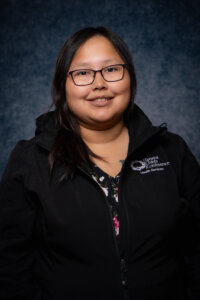By Linden Stackiokas
 When people talk about their jobs, a lot of them don’t seem very enthusiastic about what they do day after day. Not so with Mariah Moses-Bergman, who practically radiates with love for her position as the Health Aide for the village of Hughes. She is so thrilled to be doing the work she does that she even volunteers to give talks to school children about how and why to become health aides.
When people talk about their jobs, a lot of them don’t seem very enthusiastic about what they do day after day. Not so with Mariah Moses-Bergman, who practically radiates with love for her position as the Health Aide for the village of Hughes. She is so thrilled to be doing the work she does that she even volunteers to give talks to school children about how and why to become health aides.
Mariah was born in Hughes, a village of about a hundred people located on the Koyukuk River, located 210 air miles from Fairbanks. When she left home to go to college, she always intended to return. After attending the University of Alaska Anchorage, she had the opportunity to move back in 2015. At that time, there weren’t any health aides in Hughes, so when she saw the advertisement for the job, Mariah eagerly applied.
She had always been interested in science, and in fact, at UAA, she had been taking the classes required in order to enter the nursing program. She heard plenty about the career by listening and observing an aunt who had been a health aide, as well as from other friends in the field. The village approved her application, and soon Mariah was in Fairbanks completing the first of four training levels. She became a Community Health Practitioner in 2016.
The first session taught her basic anatomy and how each system in the body operates. Three other sessions, each about a month long and conducted in Fairbanks, taught her increasingly specific details about the body, as well as how to diagnose and treat various illnesses. She finished her fourth segment of the training in 2019. As Mariah put it, “After every session, you become a little more independent in that you can do more with and for patients. The truth is that even with the book learning and the work you do with actual patients during the trainings, your real learning happens when you are on the job as a health aide.”
Asked how being a health aide is different from being a nurse, Mariah explains that “A Health Aide is sort of in between a nurse and a provider like a physician’s assistant is to a doctor. We have to make more decisions in the field, where a nurse might have to ask a doctor’s permission to do the same things in a hospital or clinic setting.”
Still, the training did not prepare her for the large amount of clinic administrative work she would encounter on the job. Since Hughes had not had a health aide, she had to organize the entire clinic. The independence of being the one in charge is freeing but stressful.
Mariah receives her greatest satisfaction in being able to “help people when they really need it.” Although she learns very confidential information, some of it about people she has known her entire life, she does not find it difficult to keep this information to herself. As she says, “Whatever I learn in this building, stays in this building.”
The hardest part of being a health aide, as one might imagine, is losing people. Mariah says, “It does not get any easier to watch people die. Learning how to come back to the job after responding to a trauma can be very difficult. It changes you – you are not the same person you were.”
To cope, she spends time with her husband, Aaron, and their four children, ages 1 through 12. She says that her husband makes it possible for her to be a health aide because he takes on the bulk of the household responsibilities and is able to be the sole caretaker for the periods when she is in training. When she does have free time, Mariah relaxes by beading. Not that she has much free time; Mariah is also on the City Council, the Tribal Council, and the Community School Council.
Although her life is too jam-packed now, Mariah is looking toward perhaps becoming a Physician’s Assistant (PA) in the future. TCC encourages career mobility and, to that end, will pay for tuition and some of the expenses involved in training to become a PA.
For now, she plans to stick with being a health aide. “It is an amazing job, and I love it.”
When asked to comment on Mariah, Keith Lund, Mariah’s supervisor, stated, “Mariah is an integral part of the community as she is the rock-solid go-between for each patient and their care team at Chiefs. She offers an amazing level of caring and concern for each patient in Hughes. We love her!”
